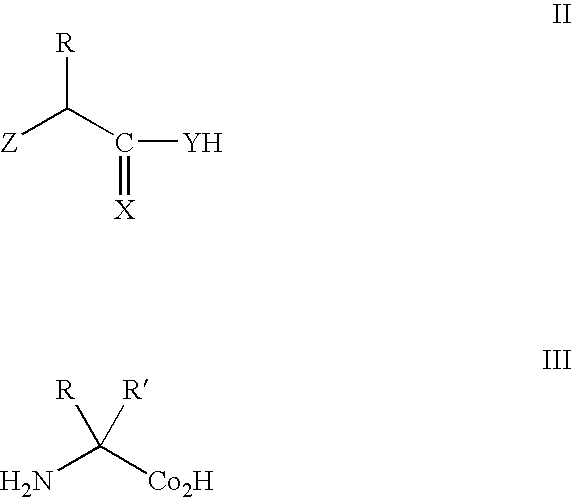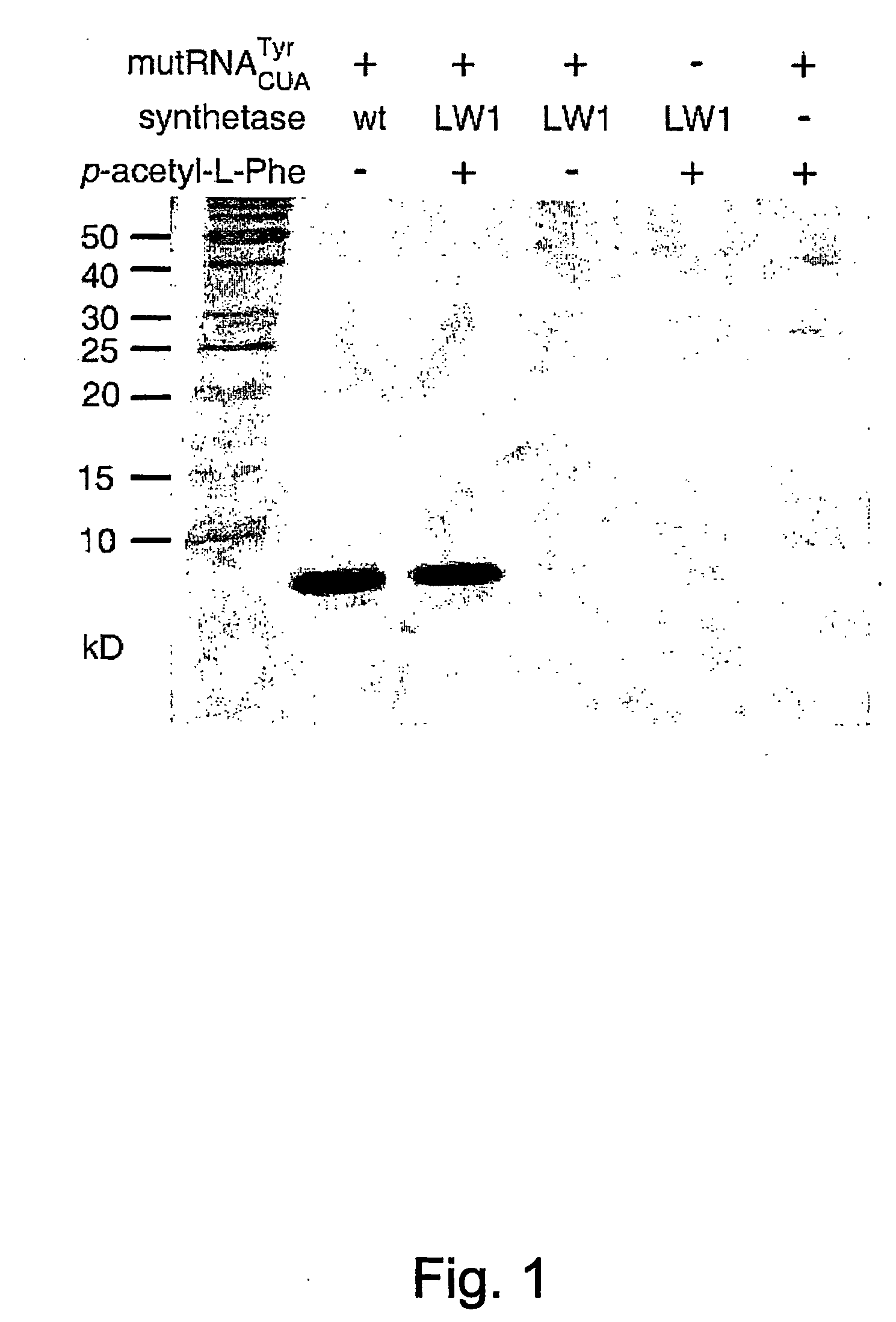Site specific incorporation of keto amino acids into proteins
a technology of amino acids and protein, applied in the field of site specific incorporation of keto amino acids into proteins, can solve the problems of low protein yield, complicated labeling of single cysteine residues, and limited method to n-terminal modification of proteins
- Summary
- Abstract
- Description
- Claims
- Application Information
AI Technical Summary
Benefits of technology
Problems solved by technology
Method used
Image
Examples
example 1
Site-Specific Incorporation of a Keto Amino Acid into Proteins
[0164] Although the carbonyl group is the most versatile of the functional groups in organic chemistry, it is absent in the genetically encoded amino acids. To overcome this natural limitation on protein biosynthesis, an orthogonal tRNA-synthetase pair was evolved that makes possible the in vivo incorporation of a keto amino acid, p-acetyl-L-phenylalanine, into proteins in E. coli with high translational fidelity in response to the amber nonsense codon. To demonstrate the utility of this novel amino acid, a protein was selectively modified in vitro with a small molecule fluorophore and biotin derivative. This new genetically encoded amino acid should greatly expand the ability to manipulate protein structure and function both in vitro and in living cells.
[0165] The genetic codes of all known organisms encode the same common twenty amino acids as building blocks for the biosynthesis of proteins. The side chains of these ...
example 2
In Vivo Incorporation of Meta-Tyrosine Analogues
[0185] An orthogonal TyrRS was generated for aminoacylation of the mtRNATyrCUA (described in Example 1 of WO 2002 / 085923) with meta-tyrosine analogues.
[0186] Preparation of mutant TyrRS library plasmids: A library of plasmids encoding mutant M. jannaschii TryRSs directed at meta-substituted tyrosine derivatives was constructed, generally following the methods described in Example 1 of WO 2002 / 085923. Briefly, six residues (Tyr32, Ala67, His70, Gln155, Asp158, Ala167) in the active site of M. jannaschii TyrRS that are within 6.9 Å of the meta-position of the aryl ring of bound tyrosine in the crystal structure of Bacillus stearothermophilus TyrRS were mutated to all 20 amino acids at DNA level using the NNK codon scheme as described in Example 1 above. The constructed plasmid library pBK-lib contained around 1×109 independent clones.
[0187] Evolution of orthogonal tRNA-synthetase pairs for incorporation of m-acetyl phenylalanine: Afte...
example 3
Exemplary O—RSs and O-tRNAs for the Incorporation of Unnatural Amino Acids
[0190] An exemplary O-tRNA that mediates the incorporation of a keto amino acid comprises SEQ ID NO.: 21 (See Table 2). Example O—RSs that aminoacylate O-tRNA with keto amino acids include SEQ ID NO.: 18-20 (See Table 2). Examples of polynucleotides include those that encode O—RSs or portions thereof include polynucleotides, e.g., SEQ ID NOs: 1-17 (for the incorporation of other unnatural amino acids), or that encode an amino acid sequence comprising SEQ ID NO.: 18-20 (for the incorporation of keto amino acids).
PUM
| Property | Measurement | Unit |
|---|---|---|
| Fraction | aaaaa | aaaaa |
| Efficiency | aaaaa | aaaaa |
| Composition | aaaaa | aaaaa |
Abstract
Description
Claims
Application Information
 Login to View More
Login to View More - R&D
- Intellectual Property
- Life Sciences
- Materials
- Tech Scout
- Unparalleled Data Quality
- Higher Quality Content
- 60% Fewer Hallucinations
Browse by: Latest US Patents, China's latest patents, Technical Efficacy Thesaurus, Application Domain, Technology Topic, Popular Technical Reports.
© 2025 PatSnap. All rights reserved.Legal|Privacy policy|Modern Slavery Act Transparency Statement|Sitemap|About US| Contact US: help@patsnap.com



